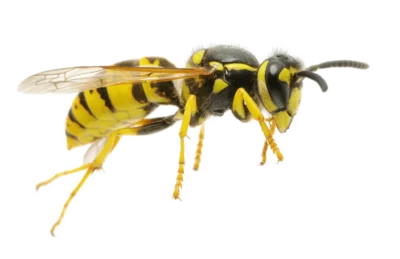Wasp Control
PURCOR Pest Solutions can help protect your home and your family with our proactive, preventive service: The Residential Defense Program.
"*" indicates required fields
Stinging insects are a constant nuisance, whether you’re going to a local park or simply doing yard work in your backyard. Stings from bees, wasps, and hornets can be painful and, for some people, life-threatening due to an allergic reaction.
Ready to shield your backyard barbecue from dive-bombing wasps? PURCOR Pest Solutions is here to help with safely eliminating stinging insects. Our wasp control services are effective and tailored to your unique environment. Contact us online or call us for a free estimate today.
What do wasps look like?
Stinging insects in Florida can be divided into three categories: bees, wasps, and hornets. All three fall under the order of Hymenoptera, and though they share notable similarities—such as flight, stinging ability, and a shared life cycle—the species of stinging insects do vary.
Multiple types of wasps live throughout the United States, including:
- Bald-faced hornet
- Yellowjacket
- Paper wasp
- Cicada killers
Most wasps are at least as large as the average worker bee. Yellowjackets are half an inch long, and bald-faced hornets can grow up to an inch in length. Significantly large wasp species, such as cicada killers, can grow up to 2 inches in length. Wasps eat various foods, including smaller insects as well as sweets and proteins like meat.
Hornets
Although technically a type of wasp, hornets are considered distinct and are classified under the genus Vespa. Hornets are visually distinctive from wasps. They have a larger, rounder midsection and a stockier overall build. Like smaller wasp species, hornets can be aggressive and sting multiple times.
Are wasps dangerous?
It hurts to be stung by a wasp or hornet. Most adults simply suffer localized pain, redness, and swelling at the site of the sting. However, stinging insects can pose more serious threats to particularly young and old individuals, as well as to anyone allergic to wasp stings.
Allergic reactions can be severe and potentially life-threatening. If you have a known allergic reaction to a stinging insect and suspect you’ve been stung, please contact a medical professional immediately.
Don’t Get Stung. Call PURCOR Pest Solutions.
Whether you have concerns about allergies or simply prefer to enjoy the outdoors without wasps invading your space, PURCOR Pest Solutions can help. We proudly offer targeted, effective wasp control you can rely on.
Our experienced technicians will inspect your property, identify the wasp issue, and create a control and prevention plan designed to give you peace of mind. Request your free estimate online today!
OTHER PURCOR SERVICES
- Pest Control Insulation
- Field Mice Control
- Gopher Control
- Ground Squirrel Control
- French Drains
- Bird Removal Services
- Homeowners Association (HOA) Pest Control
- Spider Control
- Bat Control and Removal
- Cricket Control
- Snake Removal
- Bee Control
- Crawl Space Restoration and Clean-Up
- Vapor Barrier Installation, Repair, and Replacement
- Fly Control
- Flea Control
- Tick Control
- Bed Bug Control
- Exclusion Services
- Mosquito Control
- Scorpion Control
- Termite Control
- Occasional Invaders
- Cockroach Control
- Ants
- Weed Abatement & Lawn Care
- Wildlife Control & Removal
- Crawlspace Services
- Commercial Pest Control
- Residential Pest Control
Frequently Asked Questions
We advise you to exercise extreme caution when attempting DIY wasp control. Wasps are naturally territorial and aggressive, meaning that any perceived threat to their nest can lead to a torrent of stings. Remember to always spray wasp nests after dusk when they go to sleep, but to ensure minimal risk to you, it is best to let the professionals take care of it.
When bees sting, they eject their stinger into your body, while wasps do not. This means that a bee can only sting you once while wasps and hornets can sting multiple times in multiple locations.
While not all wasps are inherently dangerous, some species can be aggressive and pose a threat, especially when provoked. For example, the orchard mason wasp is a beneficial species that is generally docile and plays a vital role in pollination, making them valuable contributors to ecosystems without posing significant risks to humans.
